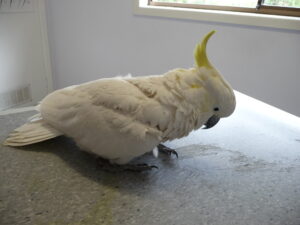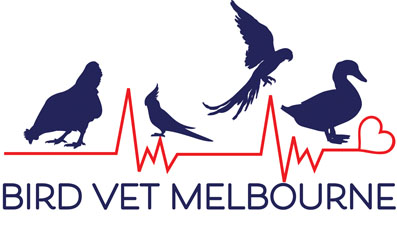Poisoning in Birds

If your bird has ingested something it shouldn't have!
If you believe your bird may have ingested something that could be poisonous you should take your bird to an avian Veterinarian. If caught early your bird-vet may be able to remove toxic material from your bird by irrigating the crop before there is time for the poison to be absorbed from the digestive tract. If there is an antidote or treatment available, starting treatment early with an avian -vet will give the best chance of success.
Heavy Metal/Lead Poisoning
The most common poisoning seen in birds at our Bird-vet -clinic is heavy metal toxicity caused by the consumption of zinc (e.g. from nibbling newly galvanized aviary wire or costume jewelry or lead (e.g. from lead light, pre-World War II paints, toys or lead weights) . Affected birds typically show a combination of neurological signs (e.g. seizures or wobbliness) and gastrointestinal signs (e.g. vomiting or diarrhoea). Diagnosis is confirmed by seeing heavy metal particles on x-ray examination or by blood tests. Avian Veterinary Treatment involves supportive treatment and chelation therapy, usually with a drug called calsenate.
Poisonous/Toxic Foods for Birds
Foods that eaten in moderation by humans are tasty and pose minimal problems can be fatal in birds simply because of the comparative size difference. Others have toxins that cause no problems with people but are specifically toxic to birds.
- Alcohol. Birds can get drunk and die from alcoholic overdose. Avoid giving your bird alcohol. Consider getting an avian-veterinary visit if your bird has had inadvertently had access to alcohol and is showing signs of intoxication.
- Chocolate, as in other species can cause vomiting, diarrhoea and seizures in overdose. Don’t share chocolates with your bird. (Share them with your Bird-Vet)
- Caffeine may causes hyper excitability and cardiac malfunction. Don’t let your bird sip your Espresso (etc) or nibble at coffee beans. Seek an avian veterinary visit if suspected access has occurred.
- Salt in excess causes increased thirst, dehydration, kidney damage. Access to salt should be restricted, seek a bird veterinarian visit if overdose is suspected.
- Avocado may cause heart problems in some individual birds, particularly canaries and cockatiels. Not all strains of avocado have the toxic agent and not all birds are susceptible but because of the risk we recommend avoiding feeding or allowing access to avocado forbirds.
- Unripened fruit and some seeds can contain toxic levels of cyanide. For example wild cockatoos will fall ‘drunk’ after eating unripened almonds.
- Onions contain a toxin that can cause haemolytic anaemia & respiratory distress in birds and should be avoided.
- Tomato leaves and other plants in deadly nightshade family can be toxic to birds and should be avoided.
- Sausage and other fatty meats. While a little bit of meat on the bone (e.g. a left over cooked chop or T-bone steak bone) can be relished by a bird and is nutritious, this is not the case with very fat meat products such as sausage. The high fat content can cause liver problem and gastrointestinal upset and should be avoided
Plants Toxic To Birds
It is simpler tolist plants that are safeto use around birds rather than the reverse as there are many obscure indoor and garden plants that can be toxic to birds at some stages of there development. If you stick with pine or native Australian trees and bushes, specifically wattle, eucalyptus, bottle brush and grevilleas this will give you a wide range of plants to choose from for perches, toys or behavioural enrichment purposes that you can be confident will be safe for your bird.
In addition to the fruits and vegetables listed above (onions, some types of avocado, tomato leaves and some unripened fruit or nuts) the following indoor or garden plants and trees may be toxic to some birds under some circumstances and should be avoided: Clematis, Diffenbachia, Flamingo Lily (Antherium), Foxglove, Lily of the Valley, Lupine, Oak, Oleander, Philodendron, Rhododendron, Virginia Creeper, Yew.
Fertilisers
Pelletized fertilizers used as plant food contain high levels of nitrate and can be particularly hazardous as they resemble seed and may be readily consumed.
Funghi/Mycotoxins
Mycotoxins are toxins produced by various species of fungi. A variety (e.g. aflatoxin B1, ochratoxin, deoxynivalenol and trichothecenes) are produced by moulds that grow on food, these can cause e.g. gastrointestinal erosion, liver and kidney damage or interference with blood clotting. Take care not to feed birds mouldy foods. Peanuts, brazil nuts, bread and sprouted seeds are potential sources to which toxicities in birds are sometimes traced.
